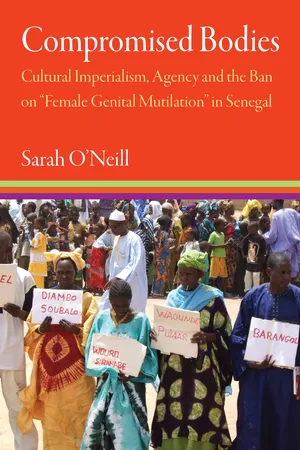
Compromised Bodies
Cultural Imperialism, Agency, and the Ban on "Female Genital Mutilation" in Senegal
- 296 pages
- English
- ePUB (mobile friendly)
- Available on iOS & Android
Compromised Bodies
Cultural Imperialism, Agency, and the Ban on "Female Genital Mutilation" in Senegal
About this book
This ethnography unravels the continuing political tensions surrounding Senegal's 1999 national ban on "female genital mutilation" The Senegalese parliament authorized a national ban on "Female Genital Mutilation" in 1999. Because only a third of the Senegalese population practiced female genital cutting (FGC) at the time, policy makers did not expect that the new law would cause controversy or provoke commotion. Yet, in Fouta Toro and among Fulani, who traditionally practiced FGC, the response to the new law was fury, and frustrations often turned violent. More than a decade after the ban, Fouta Toro was considered "the most difficult region" for anti-FGC activists, both from inside and outside the government. Tires were burned, international NGO delegates were threatened, and activists publicly speaking out against the practice were religiously condemned. Animosity toward the ban remains palpable in the region to this day. The ban, many (but not all) locals say, is nothing other than an overt act of Western cultural imperialism imposed on their community. For these individuals, resisting the ban is critical for maintaining the autonomy and integrity of a traditional way of life. And from the outside, opposition to the law and NGOs can seem unified.However, anthropologist Sarah O'Neill discovers that on the ground, there are tensions between those who oppose the ban and those who support it—even as that support is nuanced and often complicated. This ethnography unravels the continuing political tensions surrounding both national and international interventions in Fouta Toro and in Senegal that place protection of the female body at the center of their concerns. By way of the many stories of ordinary women and men caught up in debates around the value of the practice and meaning of FGC, Compromised Bodies reveals the personal struggles and difficult decisions Fulani face, be they traditional cutters, religious leaders, mothers, husbands, divorced women, or anti-FGC activists.
Frequently asked questions
- Essential is ideal for learners and professionals who enjoy exploring a wide range of subjects. Access the Essential Library with 800,000+ trusted titles and best-sellers across business, personal growth, and the humanities. Includes unlimited reading time and Standard Read Aloud voice.
- Complete: Perfect for advanced learners and researchers needing full, unrestricted access. Unlock 1.4M+ books across hundreds of subjects, including academic and specialized titles. The Complete Plan also includes advanced features like Premium Read Aloud and Research Assistant.
Please note we cannot support devices running on iOS 13 and Android 7 or earlier. Learn more about using the app.
Information
Table of contents
- Cover
- Series Page
- Title Page
- Copyright
- Dedication
- Contents
- Introduction
- Interlude. The Event
- 1. Events, Representations, and the Beginning of the End of Excision in Senegal
- Interlude. The Events of Opposition to the Law and Nongovernmental Intervention in Fouta Toro
- 2. Making Gender: Changing Traditions and the Procedures of Cutting
- 3. Curbing Desire: Gender Socialization and the Physical Foundations for Moral Personhood
- 4. Pleasure, Desirability, and Purity
- 5. Whose Law, Whose Body, Whose Rule? The Opposition to the Law and FGC Sensitization in Fouta Toro
- 6. A Right to Health, Freedom of Speech, and Nondiscrimination: The Role of Human Rights in the Abandonment Movement in Fouta Toro
- Epilogue
- Glossary of Pulaar Terms
- Notes
- Bibliography
- Index
- Acknowledgments